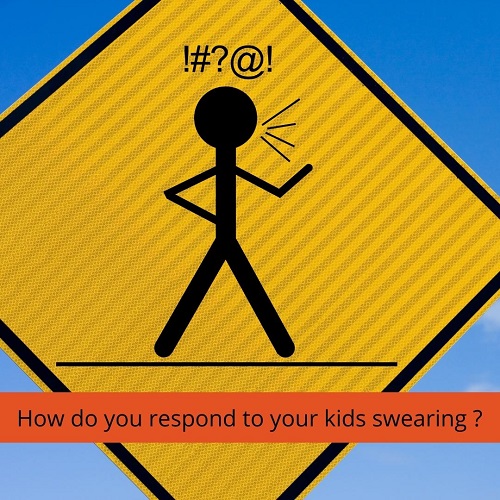Responding to Your Kids Swearing
by Kathy Slattengren, M. Ed., Priceless Parenting (sign up for monthly parenting newsletter and receive 20+ printable charts for kids and parents)

When children swear, it certainly catches our attention! How should we respond when this happens? There are a number of ways to handle it depending on the situation.
Trying Out Swearing
Young children often try swearing at some point. One day our daughter was coming home from preschool when she dropped something while getting out of the car and exclaimed "F#@$!"
My husband calmly asked her if she knew what that word meant. She said she didn't know what it meant and he explained that it's best not to use words she didn't know the meaning of since they might offend other people. She accepted that explanation and didn't say the word again.
Swearing and Name Calling
One mom told the story of driving her 5-year-old son, Nick, home from preschool one day when he announced "John is an ass!" Taken aback by this inappropriate name calling, she responded to Nick "Good boys do not use language like that. You should never call anyone that name."
She then asked Nick why he said that. Nick explained that John was always asking him to play every day. She replied "That's a really nice thing that John is doing. You should be happy that he wants to play with you." That remark shutdown the conversation and Nick was now mad both at John and his mom.
Let's take a step back and see how this might have played out differently. In the dialog below, Mom ignores the inappropriate language and avoids telling Nick that he should be happy that John is asking him to play.
Nick: "John is an ass!"
Mom: "You sound really angry."
Nick: "Yeah, he is always asking me to play with him every day."
Mom: "Why is that a problem?"
Nick: "Because sometimes I'm already playing a game with someone else and I don't want to stop in the middle of it."
Mom: "John wants you to stop what you are playing and go play with him."
Nick: "Yeah, but I don't want to."
Mom is now making headway in understanding why Nick is feeling angry with John. She's also helping Nick gain insight into the underlying issues. Once they truly understand the situation, they can brainstorm possible solutions.
Mom can always go back later and address Nick's choice of words. When Nick is calm, he'll be in a better frame of mind for considering other ways he could express his anger.
Swearing in Anger
How about if you give your teenage son a consequence and he responds by swearing? This parent's response reenergizes the argument:
Parent: "That's it. I have nothing more to say."
Teen: "#%$*#!"
Parent: "Don't you dare talk to me that way."
Teen: "I can if I want to. You're not fair."
Parent: "You will not use those words with me."
Teen: "Yes I will. You don't control my mouth."
Parent: "We'll just see about what I can control!"
The parent's response is escalating the situation. Unfortunately this parent is also trying to control something the teen ultimately controls - what he says.
Here is a parent response which does not encourage further discussion:
Parent: "That's it. I have nothing more to say."
Teen: "#%$*#!"
Parent: Says nothing.
Much later when you are both in a good mood, you can discuss your feelings about the swearing.
Considering The Example You Set
Clearly if we don't want to hear our children swearing, we need to not be swearing ourselves. Swearing can be a hard habit to break! However, by choosing better ways to express anger and frustration, we set good examples for our children to follow.
Our children also learn by how we respond when they swear. If we lose it when they swear, they learn that swearing is like having a magical power over us. All they have to do is swear to get a big reaction and keep the argument going. If we can remain calm, we can react in ways that encourage better language in the future.